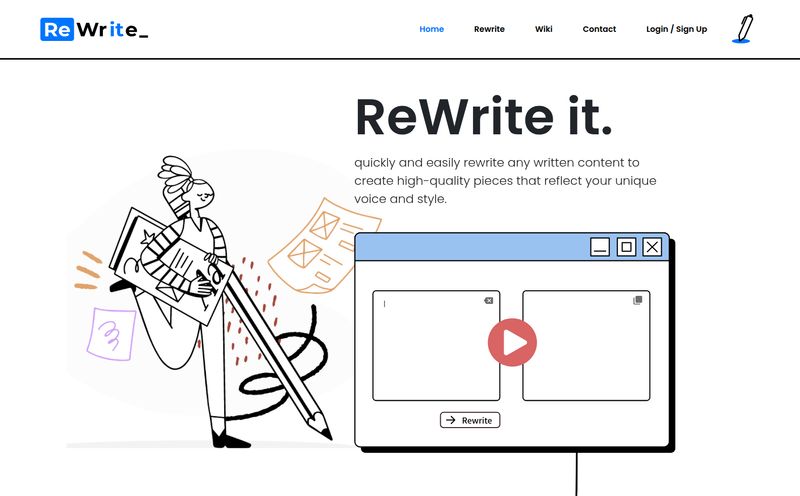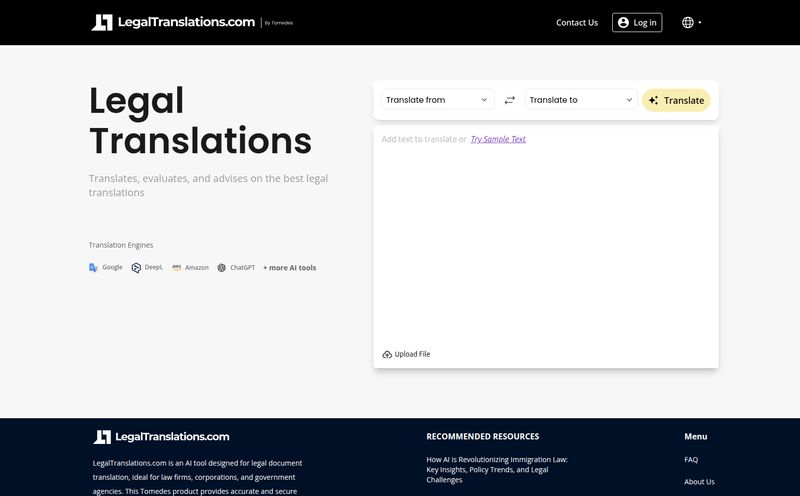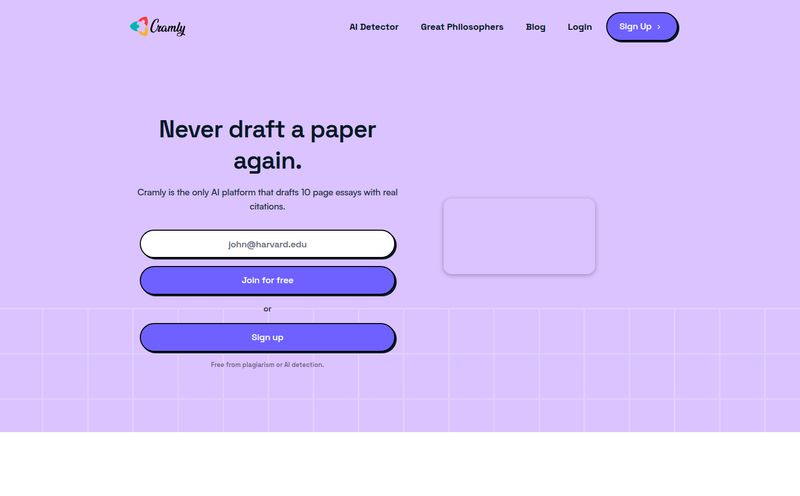If there’s one part of the job application process that everyone collectively loathes, it’s the cover letter. I mean, I really, really dislike writing them. It feels like this bizarre, formal dance where you try to repackage your resume into prose without sounding like a corporate robot or a desperate pick-me. You pour your heart and soul into a page, attach it to your application, and send it off into the digital void, wondering if a human will ever even lay eyes on it.
For years, I've told people to just power through it. It's a necessary evil. A box to be checked. But recently, I've been seeing a new crop of tools pop up, promising to slay this dragon for us. I'm talking about AI Cover Letter Generators. As someone who lives and breathes SEO and digital tools, I was skeptical but intrigued. Could a machine really capture my unique experience and voice? Or would it just spit out generic fluff?
So, I went hunting. And I found one that seemed promising, part of a suite of tools from a site called Declom.ai. The pitch was simple: give it your resume, paste in the job description, and presto! A tailor-fitted cover letter. Sounds like magic, right?
The Bumpy Road to a Perfect Application
My journey to test this thing started, as many internet adventures do, with a big fat 404 NOT_FOUND error. Seriously. The first link I tried was a dud. My initial thought was, “Well, this is a great start.” But then I chuckled. It felt... appropriate. The path to a new job is never a straight line, so why should the path to the tools that help us get there be any different? It's a reminder that even in our slick, automated world, things can be a bit messy and imperfect. And honestly, that makes me trust the process more, not less.
After a little more digging, I got to the heart of what this tool—and others like it—claims to do. And it's pretty clever.
The Core Idea: A Smart Translator
Think of this tool not as a writer, but as a translator. It takes the language of your resume (a list of achievements, skills, and past roles) and translates it into the language the hiring manager wants to hear (how those specific skills and achievements solve the problems outlined in their job description). It’s designed to draw a straight, unmissable line between your experience and their needs.

Visit Cover Letter Writer
The process is incredibly straightforward. You upload your resume, copy-paste the job description for the role you’re targeting, and the AI gets to work. It scans both documents, identifies the key qualifications and requirements, and then drafts a letter that explicitly highlights the moments in your career that align with what they’re looking for. No more agonizing over which project to mention or how to phrase your impact. The machine does that initial heavy lifting.
The Good, The Bad, and The AI-Generated
So, does it work? Like any tool, it has its brilliant moments and its... teachable ones. After playing around with the concept, here's my breakdown.
The Major Upside: Your Personal Hype Man
The biggest advantage is speed and the elimination of that dreaded “blank page” syndrome. It’s like having a personal hype man on standby. You know you’re qualified, but you're struggling to put it into words. This tool gives you a running start. It can produce a solid, well-structured draft in seconds, which is a game-changer when you're applying to multiple roles and feeling the burnout. It’s fantastic at connecting the dots, ensuring the letter you send is actually relevant and not just a generic template you've used a dozen times. Its a solid starting point for anyone who freezes up when it's time to write.
The Inevitable Catch: Garbage In, Garbage Out
Here’s the thing, and it’s a big one. The AI is a powerful engine, but you have to give it good fuel. The most common complaint I see about tools like this is that the output is generic. But 9 times out of 10, that’s because the input was weak. If your resume is a vague, jargon-filled document, your AI-generated cover letter will be a vague, jargon-filled mess. It can't invent achievements for you.
To get the best results, you need a well-written, detailed resume with quantifiable achievements. Don't just say you "Managed social media"; say you "Grew Instagram engagement by 45% in six months by implementing a new content strategy." The more specific your resume, the more specific and compelling your cover letter will be.
The Customization Conundrum
The other potential downside is the limit on deep customization. An AI can’t capture your unique personality, your humor, or your genuine passion for a company’s mission—at least not without a lot of guidance. The drafts these tools produce are professionally sound but can lack that human spark. For some roles, especially in highly creative or leadership positions, that spark is everything. For others, a clear, concise letter showing you meet all the qualifications is more than enough.
A Quick Detour: Is Using an AI Cover Letter Cheating?
I can already hear some of you asking this. Is it ethical to have a robot write your cover letter? In my book, it's not cheating; it’s just being smart. Let's be real, we all use tools to make our work better. I use SEO platforms like Ahrefs to analyze backlink profiles, writers use Grammarly to check their prose, and developers use code libraries so they don't have to build everything from scratch. This is no different.
An AI cover letter generator is a tool to create a first draft. The responsibility is still on you to review it, refine it, and inject your own voice into it. Don't just hit send. Use it as a starting block, not a finish line. Add a personal anecdote, tweak a sentence to sound more like you, and for goodness sake, double-check that it got the company's name right. It's an assistant, not a replacement for your own effort and intelligence.
What's the Price on This Magic?
As for this specific tool I was chasing, I couldn't find a clear pricing page—which, combined with the 404 error, suggests it might be in beta, part of a larger package, or perhaps has since been taken down. Many AI writing tools operate on a freemium model. They might offer a few free runs to get you hooked, then move to a subscription or a pay-per-use model. I'd imagine a fair price would be a small monthly fee for job-hunting power users, or perhaps a free model supported by other paid career services.
So, Who Is This Actually For?
I see a few groups getting massive value from this kind of technology:
- The Volume Applicant: Recent graduates or people in fast-moving industries who need to apply to dozens of jobs a week. This tool saves precious time and energy.
- The Career Changer: Someone switching industries who isn't sure how to frame their transferable skills. The AI can be great at spotting and articulating that crossover.
- The Unconfident Writer: Anyone who simply hates writing and procrastinates on applications because of it. This removes the biggest barrier to entry.
It might be less useful for someone applying for a C-suite job or a highly niche creative role, where a deeply personal, networked approach is probably going to be more effective than a cold application anyway.
Frequently Asked Questions
Can an AI cover letter actually get me a job?
An AI cover letter can get you past the initial screening and into the “interview” pile. It helps you check the right boxes and show you’re a strong fit on paper. But it’s your resume, your interview skills, and your personality that will ultimately land you the job.
Will recruiters know I used an AI tool?
If you just copy and paste the raw output, maybe. Some AI writing has a certain... flavor. But if you use it as a base and spend 5-10 minutes editing it to sound like you, it’s highly unlikely anyone would know or care. They care about whether you're qualified, not which tools you used to communicate that.
What’s the most important input for an AI cover letter generator?
Your resume. Absolutely. A detailed, achievement-oriented resume is the key. Second to that is a specific job description. The more detail you give the AI, the better the output will be.
Are AI cover letter generators free?
Some are, some offer free trials, and some are part of a paid subscription. The market is still new, so you'll find a mix of pricing models. Always check for a free trial to see if you like the results before paying.
How can I make my AI-generated cover letter better?
Proofread it! Then, add a personal touch. Start with a sentence about why you are personally excited about that specific company. End with a sentence that reflects your own voice. Check for tone and make sure it aligns with the company culture. It only takes a few minutes.
Is this better than just using ChatGPT?
It can be. While ChatGPT is incredibly powerful, a specialized tool like this is fine-tuned for one specific task. It's often designed with a better user interface for this purpose (like easy resume uploads) and its prompts are optimized behind the scenes to produce a better, more relevant cover letter structure right out of the box.
Final Thoughts: A Tool, Not a Magic Wand
At the end of the day, an AI cover letter generator is an incredibly powerful assistant. It’s not a magic wand that will instantly solve all your job-hunting woes, but it is a fantastic way to streamline one of the most tedious parts of the process. It's a digital starting block that lets you get into the race faster.
Embrace the technology, but don't abdicate your responsibility. Use it to build a strong foundation, then add your own human touch to seal the deal. The future of job applications isn't about letting robots do everything for us; it's about using smart tools to handle the grunt work so we can focus on what really matters: showing up as our authentic, qualified selves.
Reference and Sources
Initial Tool Discovery: The generator I investigated appears to be part of the Declom.ai suite of tools.
On Recruitment Trends: For more on how technology is shaping hiring, the Society for Human Resource Management (SHRM) is a great resource.
On AI in Writing: Discussions around the ethics and utility of AI writers are ongoing. Platforms like Grammarly's blog often touch on the intersection of AI and effective communication.



